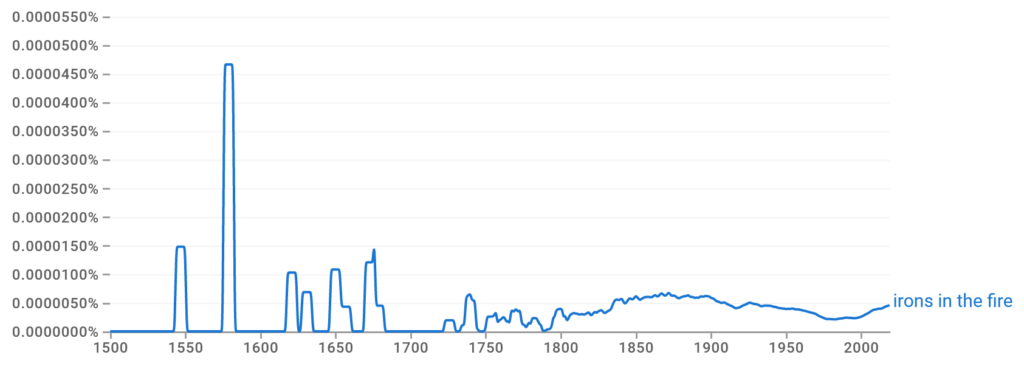Too many irons in the fire is an idiom signifying the chaos of someone taking on too much at once. It’s a phrase rooted in the imagery of overloading oneself with tasks, often leading to inefficiency or burnout.
Idioms, like too many irons in the fire, are common phrases or expressions we use that carry figurative meanings and are not to be interpreted literally. They’re essential to the English language because they provide creative ways to communicate big ideas and emotions.
In this article, I’ll go over its meaning, variations, origins, related terms, and how to use too many irons in the fire effectively in our everyday language. So, take a load off and read on as I dig into an idiom that encompasses the art of juggling life’s many tasks!

What Does the Idiom Too Many Irons in the Fire Mean?
The idiom too many irons in the fire means being involved in or attempting to handle too many tasks or responsibilities simultaneously, often leading to overcommitment or a risk of being unable to manage everything effectively.
The Cambridge Dictionary defines it as “to be involved with many activities or jobs at the same time or to make certain that there are always several possibilities available.”
Too many irons in the fire is a phrase most of us can relate to today. I’m a mother of two and the breadwinner in the family with my freelance career. I also turn all my hobbies, such as photography, crafting, and writing books, into businesses. I volunteer with my kids’ schools, extracurricular activities, etc.
I’m also pretty serious about gardening and homesteading, which takes up a ton of time. Needless to say, I always have too many irons in the fire, but I’m high-functioning and have a great support system within my family. That’s not always the case for others, and that’s where this idiom takes on more of a warning.
Literal Meaning vs. Figurative Meaning
The literal meaning of too many irons in the fire whips up an image of a blacksmith trying to work with too many tools in the fire at once. That hypothetical situation is what leads to its figurative use—to represent overcommitment or taking on more responsibilities than one can handle.
Variations of the Idiom
These few variations carry the same idea as the basic idiom but may be used in slightly different contexts.
- Don’t put too many irons in the fire
- More than one iron in the fire
- So many irons in the fire
How Is Too Many Irons in the Fire Commonly Used in Context?
The idiom too many irons in the fire vividly captures the challenge of juggling numerous tasks simultaneously. Often employed to describe situations of overcommitment or excessive responsibilities, this expression conveys the potential pitfalls of spreading oneself too thin. To explore its usage in depth, the following sections provide valuable insights:
What Are the Different Ways to Use Too Many Irons in the Fire?
- In your workplace: Describing someone handling too many projects simultaneously. “With all the role shifts and layoffs, I’ve got too much work to do, too many irons in the fire.”
- In your personal life: When discussing one’s excessive commitments outside work. “I’ll admit, with all my extracurriculars, side jobs, and volunteer work, I’ve got too many irons in the fire.”
- When talking about others: If you notice someone is taking on too much. “I hate seeing Mom have so many irons in the fire around the holidays. She burns herself out.”
What Are Some Tips for Using Too Many Irons in the Fire Effectively?
- It’s ideal for discussing huge workloads and time management challenges.
- You can use it humorously to describe anyone’s busy state.
- Avoid using it to downplay someone’s capability to multitask. Some of us like having a lot of irons in the fire.
Where Can You Find Examples of Too Many Irons in the Fire?
From business books, lifestyle blogs, and everyday conversations, especially in contexts discussing work-life balance, you’ll find this idiom in use.
Take the 1987 British rock song by The Cardiacs, “There’s Too Many Irons in the Fire,” for example. A few years later, in 1946, The Mills Brothers recorded a hit song called “Too Many Irons in the Fire.”
It’s also being used in journalism. For example:
The job boosted his personal celebrity and arguably the paper’s profile, but he rapidly had too many irons in the fire in broadcasting for the BBC to give the paper his full attention or commitment. (The Guardian)
What Is the Origin of the Idiom Too Many Irons in the Fire?

The origin of the expression too many irons in the fire can be traced back to the practice of blacksmithing. In this context, if a blacksmith tries to heat numerous pieces of iron simultaneously, it results in a cooled fire, and none of the iron pieces receive adequate heat. The expression itself has its roots in the mid-1500s.
How Did the Idiom Evolve Over Time?
From its blacksmith origins during the 1500s, the phrase eventually became a metaphor for over-commitment and the challenges of multitasking in different aspects of life. It may not be heavily used today, but the idea it represents sure does.
What Are Some Related Terms to Too Many Irons in the Fire?
Play around with alternatives to the phrase to avoid being too repetitive in your writing.

Synonyms
- Biting off more than one can chew
- Too many balls in the air
- Multitasking
- Overextending oneself
- Working too much
- Overworked
- Juggling too much
Antonyms
- Relaxed
- One step at a time
- Single-tasking
- Prioritizing
Too Many Irons in the Fire: Test Your Knowledge!
Choose the correct answer.
What Have We Learned About Too Many Irons in the Fire?
Too many irons in the fire is more than just an old blacksmith’s saying; it’s a cautionary reminder of the pitfalls of overcommitting, and it’s more relevant today than ever before. It highlights the importance of balance and the risk of inefficiency that comes with taking on more tasks than one can manage.
I broke down details about its deeper meaning and origin and shared a few variations and alternatives you can use. I hope the examples from real life helped you better understand the idiom.
For more awesome idiom guides like this one, stick around and look through our collection here on the site!
